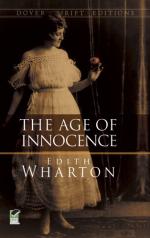Mrs. Manson Mingott had long since succeeded in untying her husband’s fortune, and had lived in affluence for half a century; but memories of her early straits had made her excessively thrifty, and though, when she bought a dress or a piece of furniture, she took care that it should be of the best, she could not bring herself to spend much on the transient pleasures of the table. Therefore, for totally different reasons, her food was as poor as Mrs. Archer’s, and her wines did nothing to redeem it. Her relatives considered that the penury of her table discredited the Mingott name, which had always been associated with good living; but people continued to come to her in spite of the “made dishes” and flat champagne, and in reply to the remonstrances of her son Lovell (who tried to retrieve the family credit by having the best chef in New York) she used to say laughingly: “What’s the use of two good cooks in one family, now that I’ve married the girls and can’t eat sauces?”
Newland Archer, as he mused on these things, had once more turned his eyes toward the Mingott box. He saw that Mrs. Welland and her sister-in-law were facing their semicircle of critics with the Mingottian aplomb which old Catherine had inculcated in all her tribe, and that only May Welland betrayed, by a heightened colour (perhaps due to the knowledge that he was watching her) a sense of the gravity of the situation. As for the cause of the commotion, she sat gracefully in her corner of the box, her eyes fixed on the stage, and revealing, as she leaned forward, a little more shoulder and bosom than New York was accustomed to seeing, at least in ladies who had reasons for wishing to pass unnoticed.
Few things seemed to Newland Archer more awful than an offence against “Taste,” that far-off divinity of whom “Form” was the mere visible representative and vicegerent. Madame Olenska’s pale and serious face appealed to his fancy as suited to the occasion and to her unhappy situation; but the way her dress (which had no tucker) sloped away from her thin shoulders shocked and troubled him. He hated to think of May Welland’s being exposed to the influence of a young woman so careless of the dictates of Taste.
“After all,” he heard one of the younger men begin behind him (everybody talked through the Mephistopheles-and-Martha scenes), “after all, just what happened?”
“Well—she left him; nobody attempts to deny that.”
“He’s an awful brute, isn’t he?” continued the young enquirer, a candid Thorley, who was evidently preparing to enter the lists as the lady’s champion.
“The very worst; I knew him at Nice,” said Lawrence Lefferts with authority. “A half-paralysed white sneering fellow—rather handsome head, but eyes with a lot of lashes. Well, I’ll tell you the sort: when he wasn’t with women he was collecting china. Paying any price for both, I understand.”
There was a general laugh, and the young champion said: “Well, then——?”




